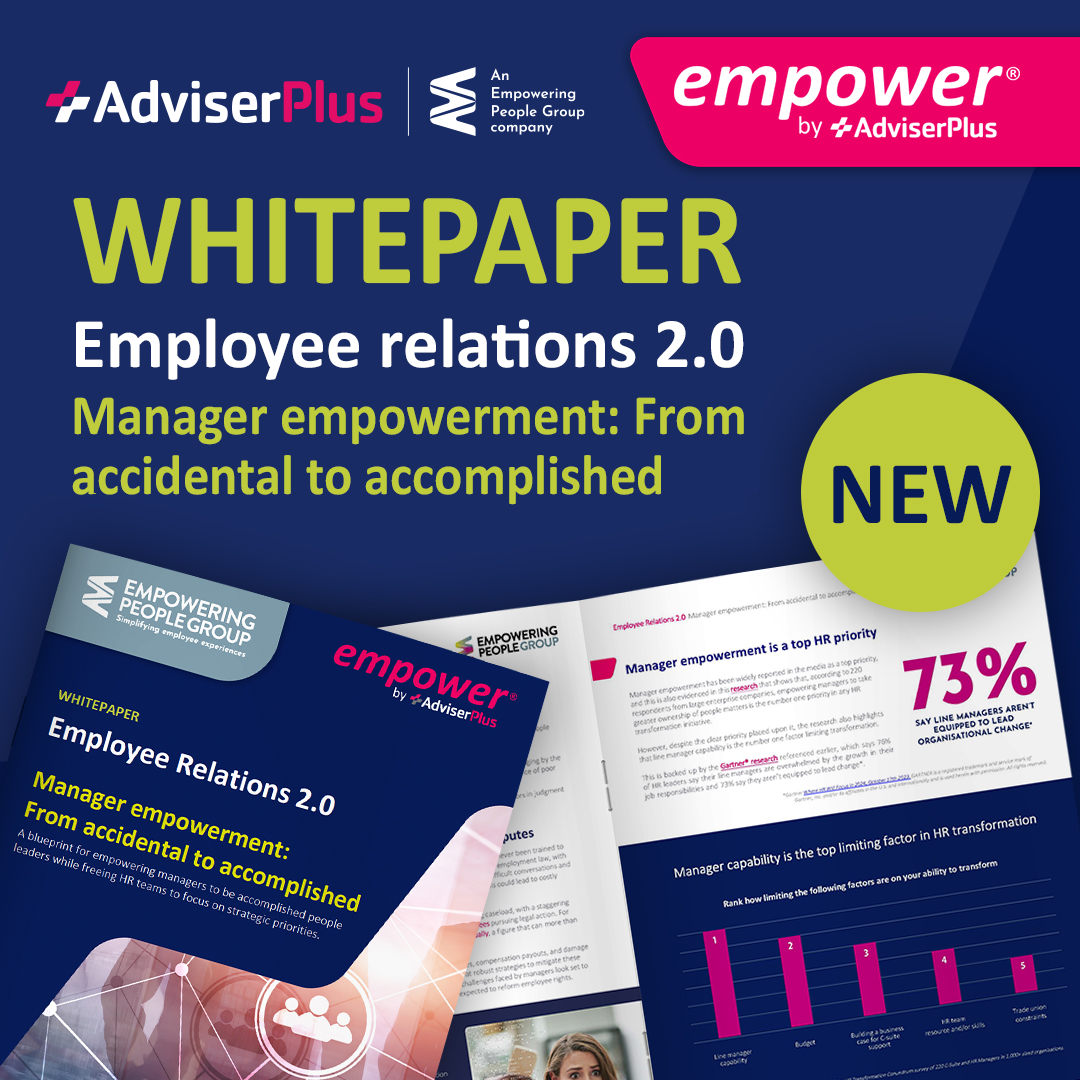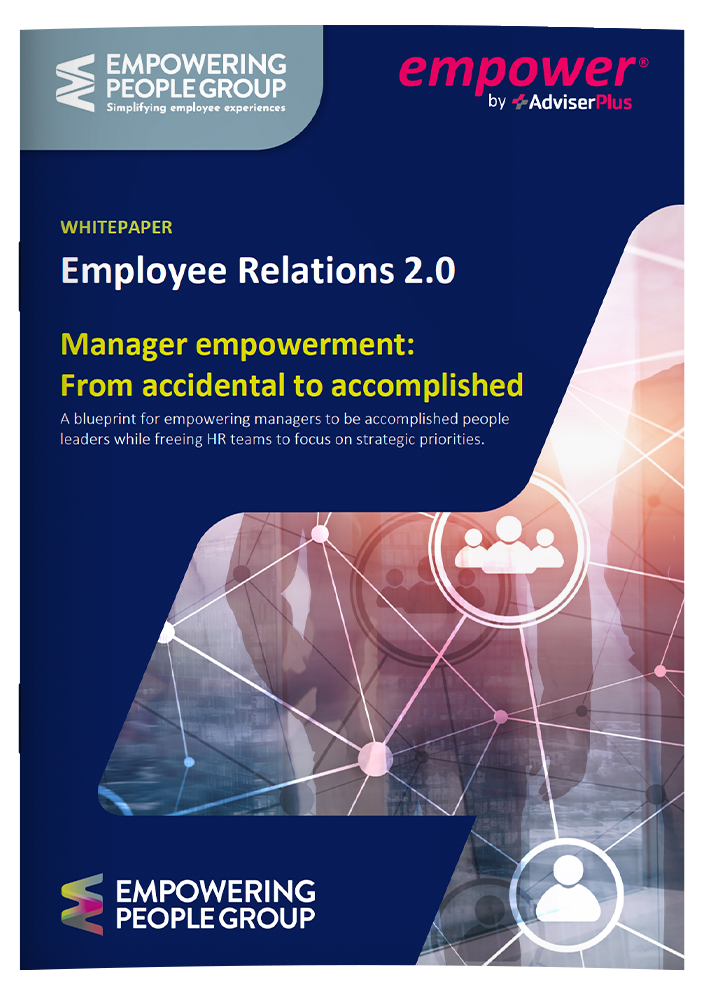Are your managers prepared for evolving workplace change?
Workplaces today are more complex than ever, with rising mental health challenges, hybrid work environments, and more employment law changes than we’ve seen in decades. These pressures are making the lives of managers increasingly complex. And if managers are not adequately trained and supported to navigate this new era of people management, businesses risk seeing a rise in poor employee and manager experiences, which has a knock-on effect on sickness absences, employee churn and rising tribunal claims.
With over 85,000 employment tribunal claims filed in 2023 alone, the employment tribunal system is already creaking, with long delays already commonplace. And the potential increases that could come if the proposed new day-one rights to unfair dismissal claims comes into force this year, we are facing a storm. For large businesses especially, the risks are huge.
 The big question is: Are your line managers equipped to handle the challenges and responsibilities that come with managing employee relations (ER) matters confidently?
The big question is: Are your line managers equipped to handle the challenges and responsibilities that come with managing employee relations (ER) matters confidently?
To answer this, download our new whitepaper, “Employee Relations 2.0: Manager empowerment – From accidental to accomplished”, here for strategies to tackle managerial capability gaps.
Now, let’s dive into why manager empowerment is a vital issue that needs to be addressed and what organisations can do about it.
Managers are overwhelmed by their new responsibilities
The role of people managers has changed significantly, and this has led to a noticeable gap in managerial skills.
Managers in modern workplaces are dealing with far more complex people-related challenges than they would have faced just a few years ago. In modern workplaces, they are expected to navigate a wide range of situations, such as:
- Connecting with and engaging hybrid and remote teams.
- The complexity of rising mental health concerns and the impact of the cost-of-living crisis on employee wellbeing.
- The experience era, which has driven up employee expectations from their employers.
- Significant employment law reform, including new sexual harassment duties, flexible working, and increased parental and carer rights.
Plus, much more. If your people managers have not been given the right training and ongoing support to navigate these complexities effectively, this can lead to several issues, such as:
Inconsistent handling of employee relations matters
Many managers are not given adequate (if any) training when they move into a people management role, so they may struggle with knowing how to handle sensitive employee concerns, resulting in inconsistent employee experiences.
Plus, if the tools for logging employee relations cases or tracking their progress aren’t accessible and user-friendly, or if policies and procedures are hard to find, it just makes things worse. All this can result in accusations of unfair treatment and lead to legal issues.
Increased absence and turnover rates
When managers lack the right tools and guidance to confidently address people-related issues before they escalate, it can lead to higher rates of absenteeism and turnover. Such issues include unaddressed performance problems. This challenge becomes even more complex in hybrid work environments.
If a manager isn’t trained to recognise early signs of stress or burnout, their team might not receive timely support. Plus, if HR can’t stay on top of performance data and trends, they risk overlooking bigger employee wellbeing concerns within departments and across the business.
In hybrid working setups, addressing these concerns proactively and with compassion is even more crucial – otherwise, it could result in lower productivity and increased absences.
Rising employment tribunal claims
New regulations for sexual harassment prevention, effective October 26th, are likely to increase tribunal claims, placing more pressure on people managers with heightened responsibilities and legal risks. With 85,000 claims already filed in 2023, effective training is crucial; otherwise, managers may make costly decisions that harm team well-being.
Labour’s proposed “Day One” rights for employees would extend protections such as unfair dismissal, sick pay, and parental leave from their first day on the job, potentially leading to more tribunal claims if managers lack proper training. If these challenges go unaddressed, all industries will be affected.
Sectors with large workforces face significant risks of unfair dismissal claims, while those under strict compliance scrutiny may suffer severe consequences from mishandled issues due to outdated HR policies. Such missteps could result in considerable reputational damage that could reach news headlines.
What can organisations do to achieve manager empowerment?
Here’s what organisations can do to set up their line managers for success:
1. Invest in leadership development
Offer regular management training to help ‘accidental managers’ become skilled leaders. Structured training should cover both soft skills and legal compliance, tailored to the specific challenges of their industry – whether managing remote teams or handling flexible work arrangements.
Managers should learn to spot signs of harassment, respond with empathy, and understand relevant laws and company policies.
Micro-learning is a great way to provide refresher training regularly to ensure managers have the latest information and are informed about the latest employment law change and how to manage requests for things like fair pay, sick leave, and flexible working arrangements, as well as how to spot signs of wellbeing concerns.
2. Digitalise employee relations processes to gain valuable analytics
Digitally transforming employee relations processes can enable actionable insights to be surfaced from complex data. Many organisations still use outdated tools, like ticketing systems – or even Excel spreadsheets and Google docs – to capture and manage employee relations data.
By investing in fit-for-purpose employee relations tools that capture ER data in a consistent and compliant way, the insights this can provide to HR on the health and performance of managers across the business is transformative.
Real-time dashboards can help identify case load challenges and can help unearth trends and patterns that may indicate pockets or poor culture or poor performance that may indicate a need for additional training or manager support. This helps HR to identify the root cause of issues and invest time in addressing these to improve the overall health of the organisation.
3. Invest in employee relations transformation that reduces reliance on HR
A vital aspect of developing a robust manager empowerment strategy is equipping managers to self-serve more employee relations matters. This requires ER case management tools that guide them through compliant and consistent processes, enabling them to address issues that they would typically escalate to HR.
The benefits of empowering line managers in employee relations are substantial, leading to significant cost savings by reducing sickness absence rates through proactive management and minimising employment tribunal claims through effective issue resolution.
Choosing the right technology is critical; it should simplify workflows rather than add complexity. By successfully transforming employee relations to include manager empowerment, organisations can reduce reliance on HR specialists, allowing them to focus on more complex issues while managers effectively manage day-to-day matters. Find out more here.
4. Proactive issue prevention: Addressing employee relations issues early is crucial to preventing them from becoming bigger problems
By confidently and compliantly managing issues in the moment, managers can reduce the risk of employment tribunal claims. For example, companies like Wickes saw a 50% reduction in employment tribunal claims through manager empowerment and improved visibility of analytics for HR.
This not only shields the business from legal risks but also boosts employee engagement, reduces absenteeism, and enhances overall productivity. Read the case study here.
By focusing on these areas, organisations can enable their managers, regardless of their experience and capabilities, to handle challenges effectively, leading to a healthier, more productive work environment.
Transform ‘accidental managers’ into confident people leaders
 Why wait for disputes to blow up into big problems? Get ahead by equipping your managers with the skills and confidence they need to tackle modern employee relations challenges – like managing remote teams or keeping up with the latest employment regulations.
Why wait for disputes to blow up into big problems? Get ahead by equipping your managers with the skills and confidence they need to tackle modern employee relations challenges – like managing remote teams or keeping up with the latest employment regulations.
Download our latest whitepaper, “Employee Relations 2.0: Manager empowerment – From accidental to accomplished”, here for practical strategies to enhance managerial capability. This empowers organisations to free up their HR teams to focus on key initiatives like EDI and mental health programmes, ultimately improving retention and reducing HR burnout.
Take action today: Protect your business from a surge in employment claims
Employment law and managing people matters is getting more complex, so it’s crucial to build a more resilient and compliant organisation.
Reach out to us for a no-obligation consultation to discuss your organisations specific requirements and find out how you can strengthen your line management capabilities and get ready for the challenges ahead.